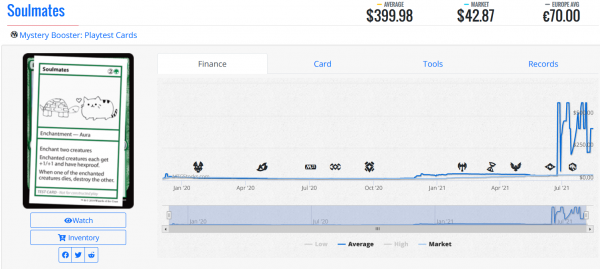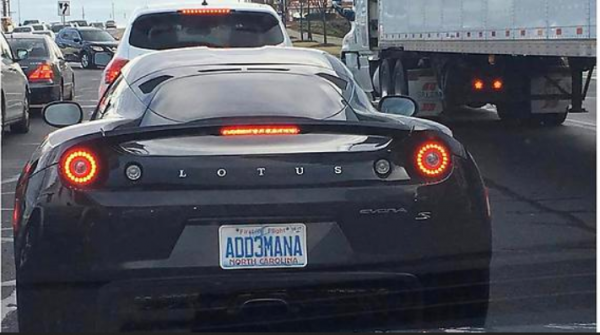Are you a Quiet Speculation member?
If not, now is a perfect time to join up! Our powerful tools, breaking-news analysis, and exclusive Discord channel will make sure you stay up to date and ahead of the curve.
The other night I was lying in the comfort of my bed browsing websites when I decided I wanted to purchase some clothes. I added the items to my cart and was ready to check out when a sudden sensation occurred in the pit of my stomach: I didn’t have my credit card with me and I don’t have the information memorized!
I really had no desire to climb out of my bed and walk downstairs just to complete the purchase. About to give up, I noticed there were alternate payment methods accepted by this website. One of those methods was PayPal. I was back in business!
I finished checking out and received my confirmation email, patting myself on the back for averting that “crisis.” However, this transaction introduced a new dilemma. For those who don’t know, I use my PayPal account strictly for my Magic transactions—I do this because I am deliberately keeping MTG money separate from the rest of my personal finances. That way, as I slowly grind out value and save money, I can put chunks aside for the college fund, where I can confidently claim, “Magic is responsible for covering my kids’ college cost.” One day, anyways.
Now that I had purchased some clothes with PayPal funds, I had to reconcile by transferring money from my personal checking account to the “Magic” (i.e. PayPal) account. That’s when a sudden realization hit me, and I knew I had a topic worthy of an article.
Magic is EXPENSIVE!
By keeping my Magic hobby financially self-contained, I have become desensitized to how expensive the hobby truly is. Buying something practical/tangible with money from my Magic account is a stark reminder of what I could be purchasing with this money if I wasn’t spending it on cards.
For example, I just recently flipped a copy of the original art Soulmates card on eBay. I purchased the card for $45 plus tax and sold it on eBay for something north of $120. After fees and shipping, I banked a cool $50 with minimal effort.
Without relative context, this feels like a small number if I’m honest. Since I mostly deal in Old School cards nowadays, I’m used to prices soaring well north of $100 and, in some cases, even above $500. Even if I think about new sets, $50 isn’t even enough for a booster box—I guess I could purchase a bundle with those profits, but that seems underwhelming.
Taking the lens away from Magic and comparing to other products and services in life, however, helps me realize just how much money we’re talking about here. I sold this single piece of cardboard for $120! As I ponder my monthly expenses, I am quickly amazed at what that $120 could also have bought. Here are some examples off the top of my head:
- A week of groceries
- My electricity bill for the month
- My cell phone bill for the month
- An outfit for work (slacks, shirt, tie)
- At least a dozen pieces of clothing for my kids
- An oil change, tire rotation, and a tank of gas
- A monthly payment of car insurance
- A couple meals ordering out for the family
I could go on and on with this list, but hopefully, this conveys my point. Because I keep Magic money in its own separate world, separate from the rest of my expenses, I’ve become numb to the numbers. Not long ago I sold enough cards to raise money to purchase a Mox Sapphire—it is heavily played and cost me $1975 (this was before the spike in Power).
I spent the money without really considering the magnitude of the purchase because I paid for the card by selling other cards. To me, that meant the card was virtually acquired via “trade” and I didn’t have to tap into my personal funds at all. But if I step away from Magic for just a couple minutes, it is baffling to me what I could have purchased with that kind of money. And don’t even get me started on something like Black Lotus!
Eye on the Prize
As I wrote the above section, I couldn’t help but fantasize about selling my Black Lotus to fund a first-class trip to Disney World for my family of four (COVID-19 aside). The fungibility of Magic makes such options extremely tempting—literally speaking, a replacement Black Lotus could be purchased to do the same thing. (In reality, I don’t expect I’ll be purchasing any Black Lotuses again now that they start north of $10,000).
But I need to stay focused on my end goal: funding my two kids’ college educations. Many distractions in the form of bills will continue to pop up along the way: repairing my backyard deck, replacing an appliance, and the occasional spontaneous PayPal purchase. But while I see Magic cards as fungible (with few exceptions), I try my hardest to view my Magic money as non-fungible. That is, I regard that money as sacred and keep it within the realm of Magic and the college account. I maintain this artificial mindset in order to drive discipline and keep me honest about how I’m accumulating resources for those first college bills 9 years from now.
If college savings isn’t on your mind, perhaps you have another long-term goal with regards to Magic? I know at least a couple of people who told me they were hoping to sell their collection one day to pay off their home mortgage. Others may identify a dream car they’ve always wanted and can justify the purchase only after selling so many cards.
As card prices climb, these goals become more and more realistic. I think I first made the “college savings” declaration about eight years ago. Back then, my collection was worth only one-tenth of what it is today, and the prospect seemed far-fetched. Thanks to multiple buyouts and booms in Reserved List collecting, the goal has never seen more possible.
After all, you can sell one single Beta Black Lotus to purchase a brand new Black Lotus car like the one above!
A Call To Action
Not everyone looks at Magic as a source of savings. It is a game after all, and also deserves to be cherished as such. Even if you don’t look to Magic to fund a large purchase of the future, I still urge you to at least stop and consider your opportunity costs when it comes to the hobby.
I’m not telling you to question every tournament entry and every purchase. To do so would be unhealthy (and likely create unnecessary anxiety). But next time you reach for your wallet to purchase that foil copy of a card—you know, the card in your deck that you already own in non-foil alt-art but not the foil version—think about the utility you’re going to get from that purchase and weigh it against other options inside and outside of Magic.
Do you really need the judge promo version of Force of Will, which will run you $450, when you could purchase a non-foil copy for under $100? In terms of play, you’d get the same utility guaranteed—so you’re really only paying that extra $350 for the “wow” factor of foiling out your deck. Before dropping the coin, just think about what else you could buy for $350.
That single piece of cardboard could pay for a lot of real-life things! And even if you want to splurge and spend the money on a luxury item (paying for groceries is hardly glamorous, I get it), you could spend that money on some super-premium durable goods. A nice, brand-name handbag or wallet, a dressy watch, some high-quality clothes, a high-end golf club…these are just some of the other items you could look into as an alternative to the judge foil Force of Will.
Don’t forget, these aren’t in lieu of purchasing that Force of Will. It’s just in lieu of purchasing the most expensive version of the card. You can still counter your opponents' spells while being tapped out by casting a non-foil version of the card, and then go out to the driving ranges with your brand new Calloway driver to boot!
Wrapping It Up
It’s easy to become desensitized to how expensive Magic really can be, especially if you’re into Old School and Vintage as I am. Prices of older cardboard has grown exponentially, far outpacing inflation. Thus, a card purchased five years ago for $30 can now create $100 of purchasing power. I keep this kind of financial gain within the hobby of Magic (or, tangentially, in my college savings account). But it’s valuable to step back and consider what that money can purchase me outside of the game.
If you are like me and hoping to cash out of Magic one day to fund a major purchase, then stay the course and do not get distracted. But if you’re into the game for the game’s sake, and are reading Quiet Speculation to make your hobby a little cheaper, then I’d urge you to consider alternatives to your premium Magic purchases.
If you weigh the enjoyment you’re likely to get from a card against the utility of another durable good you could buy with that money, you may shock yourself. I know I was recently surprised when I bought some clothes from my PayPal account and realized just how inexpensive clothes can be relative to this cardboard. A booster box will cost you $100; that can buy you a piece or two of some very high-quality, brand name clothes. You could buy your groceries for the week. You could buy a very high-end bottle of Bourbon. The list goes on and on.
I’m not telling you you have to pick up these other hobbies. I’m just taking this moment to remind you about the rest of life, and the fact that Magic is very expensive, relatively speaking. Next time you’re trading cards or selling to a store, think twice before using your proceeds to buy more cardboard. You just may find your next hobby or passion by branching out, all without dropping a dime of your personal savings.






